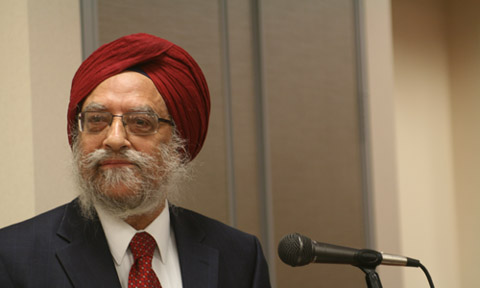Dr. Amritjit Singh gives a talk on “The Minority Psyche: Between South Asia and North America” on April 20 at Delhi University in India.
Singh, Langston Hughes Professor of English at Ohio University, is currently a Fulbright-Nehru Visiting Professor of English at the University of Delhi.
Abstract: In my talk, I shall attempt to convey a measure of my goals in my mixed-genre work-in-progress on the meaning of being a South Asian as a global citizen since the 1940s. A personal but not autobiographical book, it will include micro-narratives from my own life, as well as historical and cultural commentary in relation to four carefully chosen historical moments that also have a resonance in my own intercontinental journey – 1948, 1968, 1983, and 2001. But I hope my analysis would have much larger consequences for our understandings of how “difference” is maintained and patrolled in democratic societies such as India and the United States, and also for how communication between the “majority” and “minority” groups in both locations might be improved to build a more cohesive and participatory sense of a democratic community.
Using Critical Race Theory, I will establish how the majority communities in both India and the United States – affected by unacknowledged privilege – face serious challenges in identifying and connecting with what I call “the minority psyche.” For example, African Americans in the U.S. and Muslims in India – roughly the same percentage of the total population in their respective locations – have very different historical formations. And yet, they share group memories and daily experiences that are quite distinct from those of most Euro-Americans in the U. S. and middle-class upper-caste Hindu citizens of India respectively. The questions I expect to raise in my analysis include the following: How do the differential perceptions, lived experiences, and cultural politics of minorities affect their relationship to the socio-economic realities they apparently share with the members of the majority? How do we come to terms with the alienation experienced by a minority through an event or public policy that members of the majority might view as innocuous or necessary for national interest? How do minority writers attempt to destabilize the dominant narratives of home and nation? How do they navigate the traps and lures of identity politics, assimilation, and ghetto existence in their fictional and life-narrative responses?
Biography: Singh served as Academic Associate at American Studies Research Centre in Hyderabad, 1974-77; Associate Professor of English at the University of Hyderabad, 1977-78; and as Professor of English at the University of Rajasthan, 1978-83. An internationally known scholar of American, African American, South Asian, and Migration Studies, Singh has lectured and/or taught in more than a dozen countries in Europe, Africa, and Asia. Books edited or authored by him include: The Novels of the Harlem Renaissance (1976, 1994); Indian Literature in English, 1827-1979:An Information Guide (1981); India: An Anthology of Contemporary Writing (1983); The Magic Circle of Henry James (1989); Conversations with Ralph Ellison (1995); Conversations with Ishmael Reed (1995); Memory and Cultural Politics (1996); Postcolonial Theory and the United States (2000); Collected Writings of Wallace Thurman (2003); Interviews with Edward W. Said (2004); and The Circle of Illusion: Poems by Gurcharan Rampuri (2011). Singh has served in leadership positions in organizations such as MELUS, USACLALS, and SALA. He received the MELUS Lifetime Achievement Award in 2007 and the SALA Distinguished Achievement Award in Scholarship in January 2014. In November 2014, he received Ohio University’s Faculty Award for Excellence in Global Engagement.



















Comments